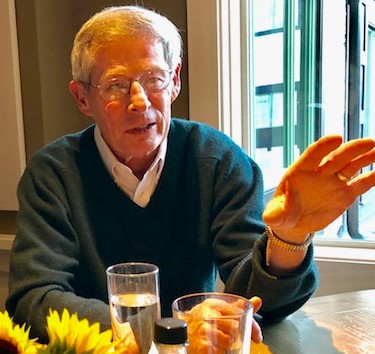March Board & Investor-Member Meeting Highlights
Friday, April 23, 2021

APEX hosted its bi-monthly Board & Investor-Member Meeting virtually on March 11, 2021, and welcomed guest speaker Dr. Jim Bowyer, Professor Emeritus at the University of Minnesota and author of The Irresponsible Pursuit of Paradise. Dr. Bowyer greeted investor-members with a question: Do any of the products you’ve used in the past two weeks have their origins outside of mining, drilling, forestry or fishing? The answer was a resounding "no." Most things we use on a daily basis can be attributed to the natural resources economy.
However, in the United States, we have a very serious problem. We’re a nation of consumers. Each American born today will consume 3.19 million pounds of metals, minerals and fuels in their lifetimes. That’s about 114 lbs/person/day. Those materials have to come from somewhere and we, as business owners and citizens, must amplify a message of responsibility for the impacts of our consumption.
Do we want to shoulder the burden here or invoke our environmental privilege and pass the impacts on to developing countries worldwide?
“Of 85 minerals and metal products reported by the U.S. Geological Survey, the U.S. was a net importer of 74 of them in 2020, including 33 of 35 minerals deemed critical to U.S. national security.”
As our net import of virgin raw materials increases, consumption is also rising worldwide. Competition for resources continues to steepen, yet the U.S. relies heavily on imports to satisfy domestic demand.
Why do we import? Partly because the resources aren’t available here and partly because of environmental regulations and policies. Regulatory uncertainty surrounding deposits causes costs of those materials to rise. The longer they lie dormant, the more expensive it will be to extract or harvest.
Every time a domestic mining project is stopped or delayed, we set in motion negative impacts in other parts of the world. The very same things we value here are put in jeopardy abroad by projects with fewer environmental regulations or protections for human rights and safety:
- Natural, wild areas
- Scenic beauty
- Rare and endangered species
- Flora and fauna
- Ground and surface water
- Air quality
- Tourism
- Recreation
Additionally, the global middle class continues to grow in developing countries. With that growth, comes a desire to produce on their terms, not under the direction of a higher-income country like Europe, North America or Asia. These developing countries hold the majority of the world’s mineral deposits as well, making domestic resources even more critical.
So, what next? How do we move forward and continue to meet the demands our consumerism-driven culture has created? Dr. Bowyer offers a few suggestions that make great sense for our region:
- Lower regulatory barriers for domestic extraction
- Prioritize recycling as a means to recover some mineral and metal resources
- Develop and share a greater awareness of the local and global impacts of our consumption
- Think carefully about what characteristics or actions should define an environmentally concerned citizen, leader or environmentalist
- Start accepting responsibility for our consumption
Many APEX investor-member companies rely on metals and minerals, and we all use these resources in our daily lives. We must move forward collectively, with a shared mindset of reframing the narrative around the natural resources industry. It’s our duty and responsibility to protect what we have, to manage our resources sustainably and to bear the weight of our consumption.
Category: News






